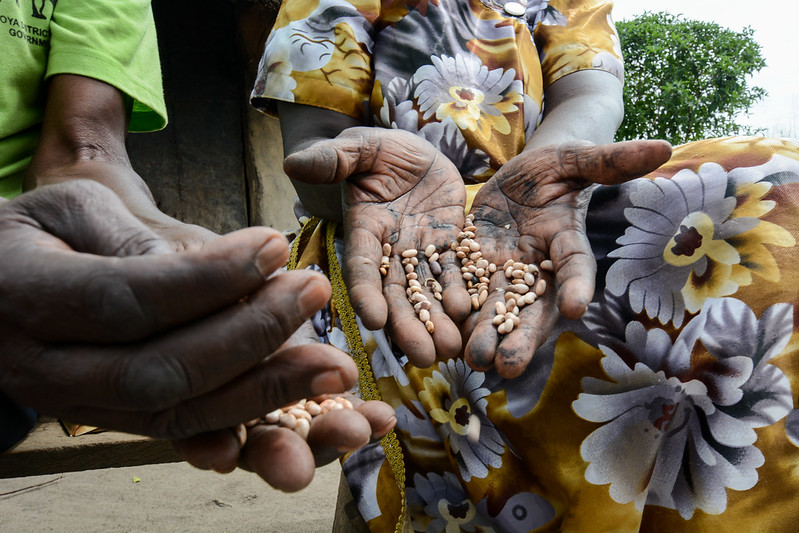Practical Action’s VINES project in Kassala and Blue Nile
 In the border regions of Kassala and Blue Nile in Sudan, food insecurity both results from and exacerbates conflict. In Blue Nile, 46% of children under 5 suffer from malnutrition. To combat this, Practical Action launched the ‘Vegetables for Income, Nutrition and Employment in Sudan’ (VINES) project in November 2023. With a budget of $500,000, the project aims to boost the productivity of small farmers by increasing agricultural production and improving local market solutions. VINES project manager, Abdallah Adam, explains that the project focuses on beneficiaries who previously lacked access to advisory services, improved vegetable seeds and knowledge of good agricultural practices.
In the border regions of Kassala and Blue Nile in Sudan, food insecurity both results from and exacerbates conflict. In Blue Nile, 46% of children under 5 suffer from malnutrition. To combat this, Practical Action launched the ‘Vegetables for Income, Nutrition and Employment in Sudan’ (VINES) project in November 2023. With a budget of $500,000, the project aims to boost the productivity of small farmers by increasing agricultural production and improving local market solutions. VINES project manager, Abdallah Adam, explains that the project focuses on beneficiaries who previously lacked access to advisory services, improved vegetable seeds and knowledge of good agricultural practices.
The Demographics of Kassala and Blue Nile
The states of Kassala and Blue Nile in Sudan, heavily affected by ongoing conflict, host hundreds of thousands of refugees and internally displaced persons (IDPs). This large population exacerbates existing food insecurity and malnutrition challenges, further complicated by climate change, conflict and erratic weather patterns. To address these ongoing issues, 6,000 small farmers in these states are participating in a project aimed at minimizing obstacles to food production. Engaging the wider community is also essential for educational and peacebuilding efforts, as part of the broader objective to improve local conditions.
The Approach
The strategy focuses on empowering farmers and enhancing market systems to boost the yield and resilience of local vegetable crops. This will be achieved through the following actions:
- Collaboration and community engagement. The strategy enhances initiatives such as Farmers Field Schools (FFS), home gardens and vegetable nurseries to educate farmers and equip them with essential skills. It also prioritizes the production of organic fertilizers from local materials to maximize productivity and sustainability.
- Strengthening the seed system. Enhanced and certified seeds are provided to farmers, enabling access to high-quality options that improve crop yields and overall agricultural productivity. To ensure affordability and productivity, vegetable seeds are often subsidized for smallholder farmers.
- Addressing post-harvest losses. Practical Action has established aggregation points, drying facilities and cooling storage units to maintain the quality of produce. The organization is also developing post-harvest practices and technologies to prepare for the next harvest.
- Improving farmers’ market access. This is done by connecting farmers with other farmers and buyers to create a collaborative environment that facilitates the exchange of knowledge and improves productivity, particularly in combating climate hazards. Vegetable Business Networks (VBNs) are crucial for strengthening market systems, both in terms of input and output markets and are particularly effective in fostering the sale of fresh vegetable produce.
The Significance
In May 2023, the World Food Programme (WFP) announced that food insecurity in Sudan was set to reach record levels. More than 19 million people are affected, equivalent to two-fifths of the population. Ongoing conflict and violence have caused basic food prices to skyrocket. Furthermore, this has intermittently forced the WFP to suspend its programs in Sudan during particularly violent periods. In this environment, operations like Practical Action become crucial. The organization provides continuous support and sustainable solutions to one of the world’s most malnourished regions.
Looking Ahead
The VINES project by Practical Action is a critical initiative addressing food insecurity in the conflict-affected regions of Kassala and Blue Nile in Sudan. By enhancing agricultural productivity and market access, the project aims to reduce malnutrition and improve livelihoods. As food insecurity in Sudan reaches unprecedented levels, such interventions can potentially create sustainable, long-term solutions and support vulnerable communities in the region.
– Bea Newington-Bridges
Bea is based in Edinburgh, Scotland and focuses on Technology Global Health for The Borgen Project.
Photo: Flickr
